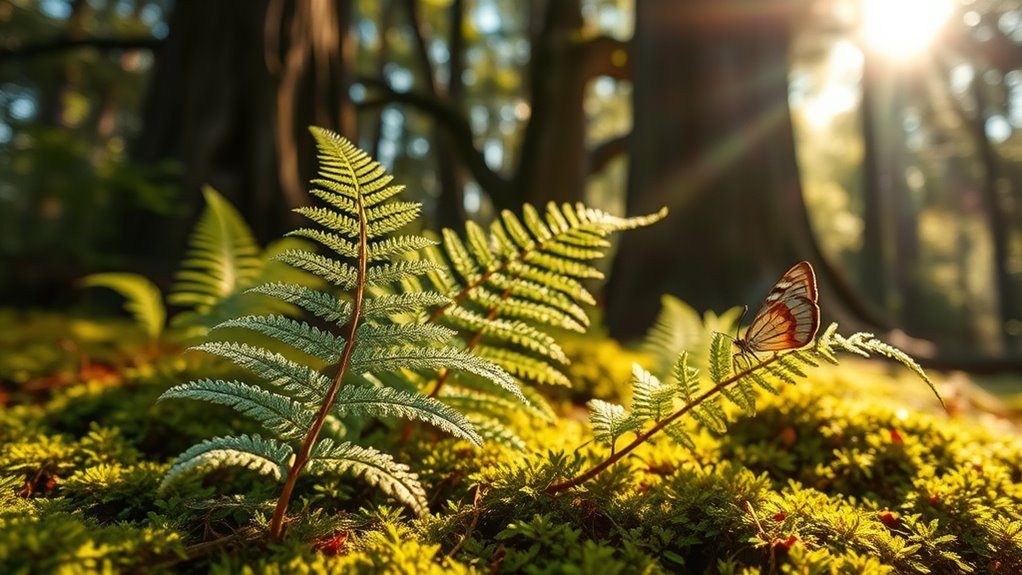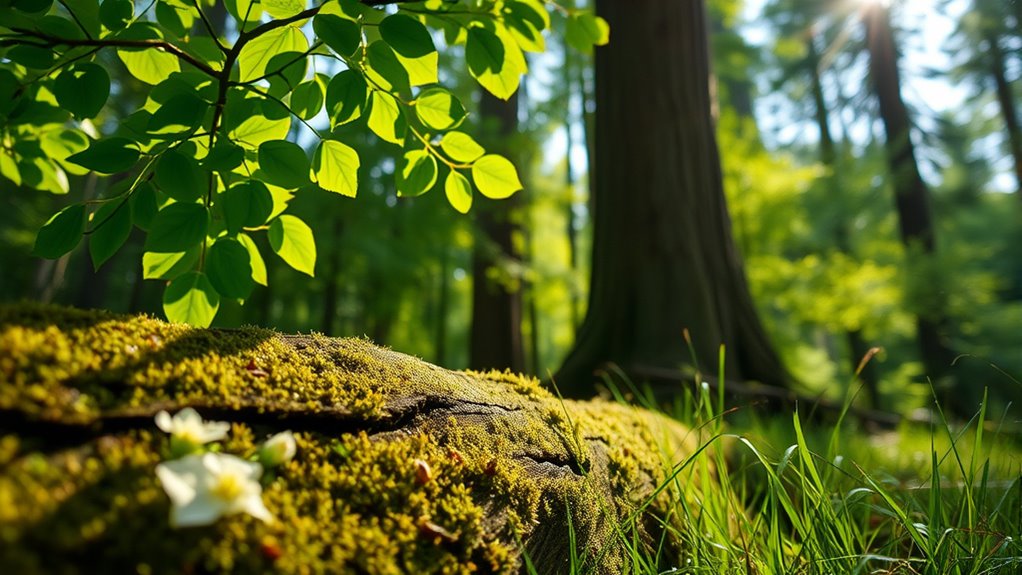Connecting with nature as a mindfulness practice involves actively cultivating a sense of ecological identity and feeling part of the natural world around you. You can do this by engaging your senses—listening to sounds, observing details, and appreciating biodiversity—and by practicing mindful activities like walking or journaling outdoors. This deepens awareness, reduces stress, and boosts emotional resilience. If you want to explore practical ways to strengthen your connection and enhance your well-being, there’s more to discover below.
Key Takeaways
- Cultivating ecological identity through mindful interactions with natural environments enhances overall mindfulness and emotional resilience.
- Engaging senses in nature—observing sights, sounds, and textures—deepens present-moment awareness.
- Regular outdoor activities like mindful walking or journaling foster a stronger sense of connection to the natural world.
- Recognizing the interdependence between personal well-being and planetary health reinforces ecological responsibility.
- Incorporating nature into daily routines supports stress reduction, emotional balance, and sustainable mindfulness practices.
Understanding the Concept of Nature-Connectedness

What exactly does it mean to be connected to nature? It’s about more than just spending time outdoors; it’s cultivating an ecological identity—feeling part of the natural world. When you’re connected, you develop a deeper awareness of biodiversity around you, recognizing the importance of every species and ecosystem. This awareness fosters respect and responsibility for protecting our environment. Being connected to nature means understanding how your well-being is intertwined with the health of the planet. It’s an active, intentional process that shapes your perspective, encouraging you to see yourself as part of a larger web of life. This mindset can be strengthened through mindfulness practices, which encourage exploration and reflection on our relationship with nature. Incorporating color accuracy in observing natural environments can enhance your perception of subtle ecological differences, strengthening your bond with the natural world. Additionally, practicing ecological awareness can deepen your understanding of how human activity impacts ecosystems and motivate sustainable behaviors. By strengthening this bond, you not only enhance your mindfulness but also contribute to preserving the rich biodiversity that sustains us all. Engaging with natural elements through practices like sound vibrations or appreciating bioluminescent fungi can deepen this connection and promote holistic well-being.
The Benefits of Engaging With Nature for Mindfulness

When you spend time in nature, you can lower your stress levels and feel more relaxed. Engaging with natural surroundings also helps you stay present and aware of the moment. These benefits make connecting with nature a powerful tool for cultivating mindfulness. Incorporating natural elements into your environment can also enhance your sense of comfort and support solutions and well-being. Additionally, studies highlight how family photoshoot fails often lead to humorous and memorable moments that can foster positive feelings and reduce stress.
Stress Reduction Benefits
Engaging with nature has a powerful ability to reduce stress and promote relaxation. When you step away from urban noise and technological distractions, your body naturally calms down. Nature’s sounds, like rustling leaves or flowing water, help drown out urban noise that often heightens stress. As you connect with natural surroundings, your nervous system shifts from a state of alertness to one of rest, lowering cortisol levels. This break from constant notifications and screens allows your mind to unwind. Even brief encounters with nature can provide immediate relief from daily pressures. By intentionally seeking out natural environments, you give yourself a chance to reset mentally and physically, making stress easier to manage and fostering a sense of peace.
Enhanced Present-Moment Awareness
Connecting with nature naturally heightens your awareness of the present moment. When you engage in flora interaction, you tune into the textures, colors, and smells around you, sharpening your senses. Wildlife observation further anchors your attention, as you become mindful of the subtle movements and sounds of animals in their environment. These activities pull you out of automatic thinking and into a state of focused presence. As you notice the rustling leaves or the flutter of a bird’s wings, your mind becomes fully immersed in the here and now. Practicing fire safety during outdoor activities can also help you stay alert and prevent hazards while enjoying nature. Developing mindfulness through nature connection can deepen your awareness and promote a sense of peace. This heightened present-moment awareness cultivates mindfulness by encouraging you to pay attention without judgment, fostering a deeper connection with your surroundings and yourself. Incorporating nature-inspired mindfulness techniques can further enhance your ability to stay grounded and attentive during outdoor experiences. Engaging in regular outdoor mindfulness practices can strengthen your skills and make your connection with nature even more meaningful. Exploring eco-friendly glamping practices can also elevate your outdoor experiences by aligning relaxation with sustainability and environmental awareness.
Practical Ways to Incorporate Nature Into Daily Routine

You can start your day with a morning walk outside to connect with nature and clear your mind. If outdoor time is limited, incorporating indoor green spaces like potted plants or a small garden can bring a touch of nature into your home. These simple practices make it easier to stay mindful and grounded throughout your routine. Engaging with nature-connectedness can significantly enhance your overall well-being and mindfulness practice, fostering a sense of environmental awareness that supports sustainable living. Creating a dedicated natural environment within your space can serve as a constant reminder to stay connected to nature, enriching your mindfulness experience. Incorporating visual cues from nature into your environment can further reinforce this connection and promote ongoing mindfulness. Additionally, utilizing AI-driven personalization in educational or wellness apps can help tailor your experience to better support your connection with nature.
Morning Nature Walks
Starting your day with a morning nature walk is a simple yet powerful way to deepen your connection to the natural world. As you step outside, tune into the birdsong melodies that fill the air, allowing their rhythms to anchor your awareness. Feel the gentle warmth of the morning sunlight on your skin, and notice how it illuminates your surroundings. Focus on your breath, inhaling the fresh, crisp air, and observe the sights, sounds, and textures around you. This mindful practice helps you start the day grounded and present, fostering a sense of calm and gratitude. Regular morning walks not only boost your mood but also strengthen your bond with nature, turning a simple routine into a meaningful mindfulness exercise. Incorporating nature-connectedness into your daily routine can enhance your overall well-being and deepen your appreciation for the environment. Engaging with the natural environment can also stimulate your senses, similar to techniques used in auditory processing therapies. Exploring local water parks can also be a refreshing way to connect with nature and enjoy outdoor activities.
Indoor Green Spaces
Bringing greenery into your indoor space offers a practical and accessible way to stay connected with nature throughout the day. You can create indoor gardens with lush plants or display nature-inspired art to evoke the outdoors. These additions boost your mood and promote mindfulness by constantly reminding you of the natural world. To inspire your choices, consider the following ideas:
| Idea | Description | Benefit |
|---|---|---|
| Indoor Gardens | Small, self-sustaining plant setups | Enhances air quality |
| Nature Inspired Art | Prints or paintings of landscapes | Sparks tranquility |
| Potted Herbs | Grow herbs on windowsills | Improves cooking and scenting |
| Vertical Gardens | Space-efficient plant walls | Adds visual interest |
| Decor Accents | Nature-themed sculptures or prints | Creates calming ambiance |
Additionally, choosing fresh plants over artificial ones can deepen your connection to nature and boost the overall calming effect. Incorporating natural elements into your decor can further enhance the sense of serenity and mindfulness in your space. Engaging in regular care of your indoor greenery can also foster a sense of responsibility and presence, strengthening your mindfulness practice. Incorporating indoor green spaces can also improve indoor air quality and contribute to a healthier environment.
Developing Sensory Awareness Through Natural Encounters

Engaging with nature offers a powerful opportunity to heighten your sensory awareness. In natural environments, your sensory perception becomes sharper as you tune into the sights, sounds, smells, and textures around you. To develop this awareness, slow down and focus on each sense individually. Notice the rustling leaves, the scent of earth, or the feel of rough bark under your fingertips. Refrain from rushing; instead, immerse yourself fully in these experiences. By consciously engaging your senses, you create a deeper connection with your surroundings. This practice helps cultivate mindfulness and an appreciation for nature’s intricate details. With consistent effort, your sensory perception will become more refined, enriching your encounters with natural environments and fostering a greater sense of presence.
Cultivating Gratitude and Reflection in Natural Settings

When you spend time in natural settings, taking a moment for gratitude and reflection can deepen your connection to the environment and yourself. Engage in nature journaling by jotting down observations, feelings, or insights inspired by your surroundings. This practice encourages mindfulness and helps you appreciate the details often overlooked. Eco therapy techniques, like mindful walking or silent observation, foster a sense of gratitude for the beauty and complexity of nature. Reflecting on what you observe cultivates a positive outlook and enhances your emotional well-being. By intentionally pausing to acknowledge nature’s gifts, you strengthen your bond with the environment and promote inner peace. These simple acts of gratitude and reflection turn your outdoor experiences into meaningful opportunities for growth and connection.
Overcoming Barriers to Connecting With Nature

Many people face obstacles that hinder their ability to connect with nature, such as busy schedules, urban environments, or feelings of discomfort in outdoor settings. Cultural barriers and accessibility challenges can also limit your experience. To overcome these, consider small steps like local park visits or urban green spaces. Seek out inclusive programs designed for different abilities and backgrounds. Adjust your expectations to focus on brief, mindful encounters rather than extensive excursions. Building a routine can gradually reduce discomfort and foster connection. Remember, nature doesn’t require perfect conditions—your effort matters.
Connecting with nature is possible through small, mindful steps despite obstacles and barriers.
- Visit nearby parks or green spaces regularly
- Use adaptive tools or facilities for accessibility
- Join community groups that promote inclusive outdoor activities
- Start with short, mindful moments outdoors
Enhancing Well-Being Through Mindful Nature Practices

Practicing mindfulness in nature can considerably boost your overall well-being by fostering a deeper sense of presence and calm. When you engage fully with your surroundings, you strengthen your ecological identity, feeling more connected to the environment. This connection enhances your emotional resilience and reduces stress, making nature therapy a powerful tool for mental health. By intentionally slowing down and observing your environment, you cultivate gratitude and a sense of harmony with the natural world. These mindful practices can improve mood, increase feelings of vitality, and promote overall life satisfaction. Incorporating regular mindful nature activities helps you build a stronger ecological identity, reinforcing your bond with nature and supporting ongoing well-being through simple, yet impactful, interactions with the natural world.
Frequently Asked Questions
How Does Nature-Connectedness Influence Mental Health Over Time?
You might notice that regularly engaging with nature boosts your long-term resilience and enhances emotional regulation. Over time, this connection helps you manage stress better, improves mood, and fosters a sense of calm. By consistently spending time outdoors, you build mental strength to handle life’s challenges more effectively, leading to lasting improvements in your overall mental health. Nature becomes a powerful tool for sustaining emotional balance and resilience throughout your life.
Can Urban Environments Effectively Foster Mindfulness Through Nature?
Sure, urban parks and green spaces can effectively foster mindfulness by offering calming corners amid chaos. When you immerse yourself in these lush landscapes, you can breathe deeply, relax, and reconnect with nature’s nuances. These vibrant venues provide essential opportunities to pause, practice presence, and promote peace, proving that even in bustling cities, mindful moments are possible, making urban environments valuable venues for nurturing mental wellness.
What Are Common Challenges Beginners Face in Practicing Nature Mindfulness?
When starting mindfulness in nature, you often face distraction management and consistency challenges. You might struggle to stay focused as your mind wanders or get easily distracted by urban noise and daily worries. Maintaining a regular practice can be tough, especially when life gets busy. To overcome these issues, set small, manageable goals and practice patience. Over time, you’ll find it easier to stay present and deepen your connection with nature.
How Does Cultural Background Impact One’S Connection to Nature?
Did you know that 70% of people worldwide feel a strong cultural connection to nature? Your cultural background shapes your perceptions and environmental values, influencing how you relate to the natural world. If your cultural perceptions emphasize harmony with nature, you’re more likely to feel connected. Conversely, if your environment views nature as separate or utilitarian, it might be harder to foster that bond. Your cultural context deeply impacts your relationship with the environment.
Are There Specific Age Groups That Benefit Most From Nature-Connected Mindfulness?
You might find that adolescents benefit most from nature-connected mindfulness, as it supports their developmental growth and emotional regulation. Similarly, the elderly can experience improved cognition and reduced stress through these practices. Both age groups gain unique advantages; adolescents develop resilience, while seniors enhance cognitive function. Engaging with nature helps you foster mindfulness, regardless of age, but these groups often see the most immediate and profound benefits.
Conclusion
By weaving nature into your daily life, you open the door to a garden of mindfulness where each leaf and breeze becomes a gentle teacher. Embrace these natural whispers, allowing them to nurture your soul like sunlight filters through leaves. With each mindful step outdoors, you’ll find yourself blossoming—more grateful, centered, and alive. So step outside, breathe deeply, and let nature’s quiet wisdom be your guiding star on this beautiful journey toward well-being.









